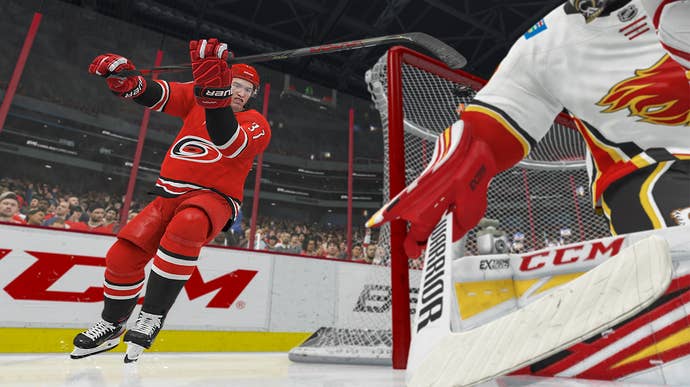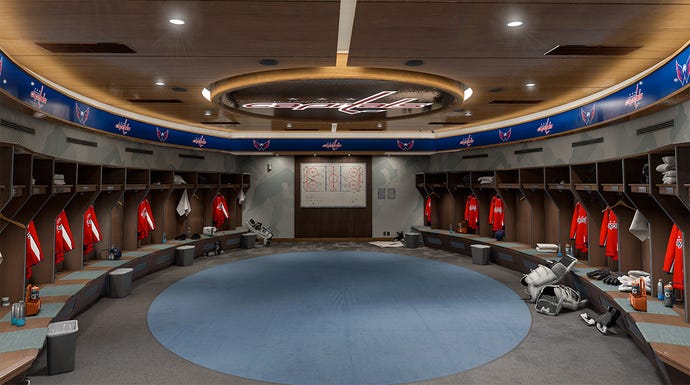NHL 21 Review: This Year's Entry Struggles to Light the Lamp
EA's hockey sim includes a long-awaited update to a classic mode, but legacy issues drag it down to the ice.
This article first appeared on USgamer, a partner publication of VG247. Some content, such as this article, has been migrated to VG247 for posterity after USgamer's closure - but it has not been edited or further vetted by the VG247 team.
Like so many other sports games right now, NHL 21 exists in an odd parallel universe. In EA's latest hockey sim, the season is commencing as normal; the fans are in the stands, and the release of the Xbox Series X and PlayStation 5 is still at least a year away. Like the rest of us, the series would prefer to pretend that 2020 never happened.
But where other sports sims are looking ahead, NHL is looking back. As in 2013, NHL is once again skipping the generational transition, instead choosing to focus on putting out one last great entry on current systems. Clearly, EA is hoping that this year's release can be the PlayStation 4 / Xbox One equivalent of NHL 14—an entry that's still held in high esteem by fans thanks to its fast action, wild hits, and nostalgic tribute to NHL 94.
Its feature set is certainly promising enough. Building on last year's generally entertaining gameplay, NHL 21 adds the series's customary array of balance tweaks and updates, including a handful of new dekes. Franchise mode now has a trade deadline minigame that lets you make deals hour by hour, and there's a new arcade-style competition called Hockey Ultimate Team Rush [HUT Rush]. But the biggest feature of them all is a revamped Be a Pro—something I've been calling for since the beginning of the generation. Add in a decent presentation and some strong legacy features like EASHL—its popular online co-op team mode—and NHL 21 would seem primed for a good season.
But like the hyped contender that secretly has a few too many holes in its roster, NHL 21's weaknesses quickly become apparent once it's on the ice. To put it mildly, NHL 21 feels like a sloppy, rushed product this year, particularly when it comes to Be a Pro, which should be its star feature. It sets out to mirror the triumph of NHL 14, but it feels more like a desultory bookend to NHL 15, the entry with cuts that would make even the Ottawa Senators blush.
I don't make the comparison to NHL 15 lightly, as I consider it probably the worst sports sim of the past decade—an entry so bad that it didn't even include EASHL, far and away the franchise's most popular mode. But when I look at Be a Pro in particular, I'm reminded of how NHL 15 superficially looked much better than its predecessor, but stripped away a lot of what made it work in the first place. Play it enough, and NHL 21's Be a Pro actually starts to feel like a step backward for the series.
In the revamped Be a Pro, you play an up-and-coming rookie trying to break into the NHL. It's clearly patterned off MLB The Show's enormously successful Road to the Show mode: the dialogue isn't voiced, most of the communication is with your coach or your agent, and the "story" is told through radio broadcasts highlighting your most recent game. After playing a quick qualifier tournament, you're whisked into the NHL, with your draft position depending on your play to that point.
On the face of it, it's a reasonable upgrade from what was in NHL 20. The presentation is stronger; you can use the money you earn to buy perks like apartments and private staff, and there's a clear sense of progression. The rapid pace of the games—most of which can be completed in about 10 minutes—combine with dynamic objectives to create a solid sense of momentum.
Where it gets into trouble is the way in which your actual level of play seems to have no bearing on how your avatar is treated. Put simply, there doesn't seem to be a way to get sent down to the minors. I was drafted by the Penguins in the second round, scored one goal in the preseason, and ended up on Pittsburgh's second line. In less than a month, I was on the top line playing next to Sidney Crosby. My coaches and teammates absolutely adored me, even when I was failing objectives.
What NHL 21 seems to forget is that the journey to the majors matters as much as the destination. In MLB The Show, you'll typically spend a full season or more in the minors, which makes it all the more satisfying when you finally make it into the big leagues. In NHL, you're a top player almost immediately. There doesn't seem to be a way to fail. Heck, you can't even get injured... or ask for a trade.
I expect this is just Year 1 for Be a Pro, so hopefully there are plenty of improvements to come down the road. What it needs most in Year 2 is depth and realism: the return of the minors, more realistic feedback, and better rewards for real success. As it stands, Be a Pro is the mode where your coach calls you over to the bench and you instinctively think, "Let me guess, you need me to turn up the pressure and score more goals."
A more successful, if somewhat understated, addition is HUT Rush—a fast-paced arcade mode in which you draft a squad and try to rack up high scores while completing objectives. Superficially an excuse to repurpose the old NHL Threes assets from when the series was trying to mimic Rocket League, HUT Rush proves to be a fun change of pace from the usual Hockey Ultimate Team grind. It does its part to give an injection of novelty to EA's card-collecting mode, which to this point has struggled to differentiate itself from its better-known peers.
Alas, I've soured a bit on NHL's gameplay overall, especially when playing with the computer. When the A.I. is around, NHL feels somehow more robotic, its lantern-jawed players bumping awkwardly as they try to cycle the puck. A scrum in front of goal feels like a slow-rolling car wreck as players pile up around the net.
It's much better when playing together with friends, the issues with teammate A.I. falling away as you rush up and down the ice. It's here that NHL's skill-based gameplay becomes more apparent, as the very best players can pull off some truly remarkable moves to bury the puck. EASHL has been a staple for years, with World of Chel offering a casual variant in which you can unlock unique cosmetics over the course of multiple seasons. NHL 21 brings little in the way of material improvements for these two modes outside of new leaderboards and competitions, but that doesn't make them any less fun to play with a friend.
Heading into the new generation, my hope is that NHL will overhaul its animation system and update its character models, both of which feel increasingly outdated compared to the competition. In hindsight, opting to avoid the Frostbite Engine was probably a good move given the technical problems that FIFA and Madden have suffered, but NHL badly needs to punch up its visuals. The stiff, weirdly-proportioned characters look worse than ever in 2020, and the skill-based gameplay would benefit a great deal from smoother, more nuanced animation.

It's the graphics more than anything else that are holding NHL back. Where other sports games have marched steadily forward, NHL feels like it's still stuck somewhere closer to the beginning of the generation. It undercuts its strengths elsewhere and makes the total package seem ramshackle and behind the times. Add in the disappointment of Be a Pro—by far the most hyped addition to this year's release—not to mention the lack of a next-gen entry, and NHL 21 feels eminently skippable this year.
It all leaves me feeling a little frustrated because I had extremely high hopes for NHL this generation. Go back and read my old preview from E3 2014: I was pumped for NHL on PS4. Instead, the past six years has felt like one big reclamation project as EA has worked to slowly but surely to restore the features cut from NHL 15. Even this year's trade deadline frenzy minigame, hyped as a new addition to NHL 21's franchise mode, is just a variation on what was originally available way back in NHL 14.
I hope NHL is better on the PS5 and Xbox Series X, but with fewer resources at its disposal than most sports franchises, I have my doubts. The good news is that NHL is closer to greatness than it might seem: overhaul the graphics, keep building up Be a Pro, and retain the progress made over the past generation, and the series may yet return to the heights it enjoyed on the Xbox 360 and PS3. Until then, NHL remains the Minnesota Wild of sports sims—the middle-of-the-road franchise that continues to struggle to get past the first round of the playoffs.
ConclusionNHL 21 tries to end the current generation on a high note, but legacy issues continue to hold it back. Its revamped Be a Pro mode is particularly disappointing, proving to be a disjointed, somewhat sloppy experience. It has its usual strengths, with online team play being a definite highlight, but longtime fans of the series will likely find this year's entry eminently skippable.



